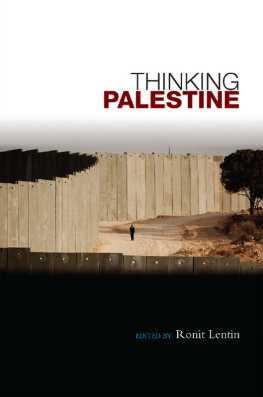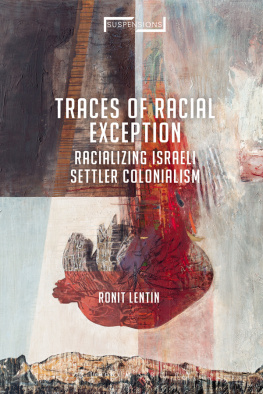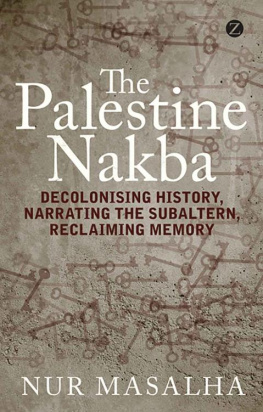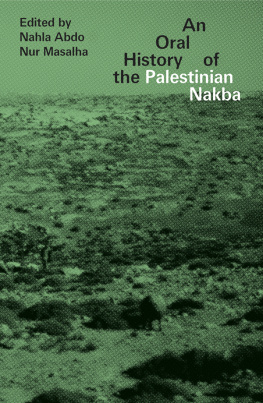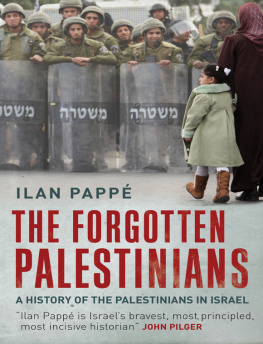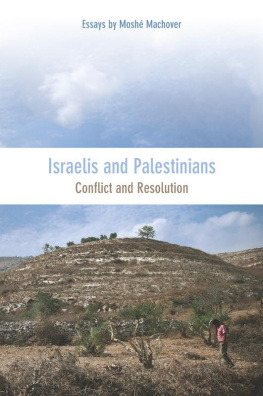Co-memory and melancholia
Co-memory and melancholia
Israelis memorialising the Palestinian Nakba
Ronit Lentin
Copyright Ronit Lentin 2010
The right of Ronit Lentin to be identified as the author of this work has been asserted by her in
accordance with the Copyright, Designs and Patents Act 1988.
Published by Manchester University Press
Oxford Road, Manchester M13 9NR, UK
and Room 400, 175 Fifth Avenue, New York, NY 10010, USA
www.manchesteruniversitypress.co.uk
Distributed exclusively in the USA by
Palgrave Macmillan, 175 Fifth Avenue, New York,
NY 10010, USA
Distributed exclusively in Canada by
UBC Press, University of British Columbia, 2029 West Mall,
Vancouver, BC, Canada V6T 1Z2
British Library Cataloguing-in-Publication Data
A catalogue record for this book is available from the British Library
Library of Congress Cataloging-in-Publication Data applied for
ISBN 978 0 7190 8170 5
First published 2010
The publisher has no responsibility for the persistance or accuracy of URLs for any external or third-party internet websites referred to in this book,
and does not guarantee that any content on
such websites is, or will remain, accurate or appropriate.
Typeset
by Helen Skelton, Brighton, UK
Printed in Great Britain
by CPI Antony Rowe Ltd, Chippenham, Wiltshire
In memory of my parents, Lia (Schieber) and Miki Salzberger-Tsabar
Contents
Preface and acknowledgements
Writing this book between the 60th and the 61st anniversaries of the Nakba and the State of Israel, in the year of the Gaza war, the bloodiest of Israels bloody wars, has been both traumatic and liberating. In particular, the book is the result of a series of dialogues conducted with a group of people without whom it could not have been written. As always, my conversations with my soul sister Nitza Aminov have sustained me intellectually, politically and emotionally.
Nitza Aminov and Tamar Avraham have given me useful interviews quoted throughout the book, and both of them and David Landy read chapter drafts and their comments and suggestions were invaluable. David Landy and Anaheed Al-Hardan acted as my research assistants and their work informs parts of this book. Eli Aminov was inspirational, and as always made sure I got the latest books relevant to my research.
Other people who assisted me in the birth of this book, directly and indirectly, include Nahla Abdo, Ronit Chacham, Honaida Ghanim, David Theo Goldberg, Smadar Lavie, Yosefa Loshitzky, Ilan Pappe, Nadera Shalhoub Kevorkian, Ahmad Sadi, Yehouda Shenhav, Oren Yiftachel, Michal Zak, Raef Zreik and Elia Zureik. I am grateful to Wakim Wakim of ADRID and Salman Natour of the Emile Touma Centre for agreeing to talk to me, and to the organisers of Mada Al Carmels Nakba conference in 2008 for inviting me to present a preliminary paper. The work of Zochrot opened up the conversation about the Nakba in Hebrew speaking to members, following the groups activities and reading its publication was invaluable. Thanks to Louis who lovingly pulled me out of my Gaza abyss.
The translations of of the Hebrew works I cite are mine, unless published translations exist.
I dedicate the book to Alana Lentin and Partho Sen-Gupta and their daughter Noam, and Miki Lentin and Miriam Levin and their daughter Arielle.
1 Introduction: living in the shadow
All biographies like all autobiographies like all narratives tell one story in place of another story. (Hlne Cixous 1997: 178)
Each one of us, Israelis and Jews, has a shadow, the shadow of the 1948 Palestinian refugees. (Uri Davis 1994: 190)
Prologue: May 2008 exile and last journey?
Feelings of doom have accompanied the preparations for my visit to observe the 60th anniversary of the Nakba and Israeli independence. It feels like my last chance to witness the contradictory rituals of the Israelis celebrating their independence and the Palestinians marking their catastrophe. I will be staying with my soul sister Nitza who persuaded me to extend this visit to encompass both the march of return, held, as in previous years on Israels Independence Day (this year falling on May 8 in Saffuriyya), and Nakba Day, held on May 15, the day the British officially exited Palestine in 1948.
I have been edgy for days before travelling, apprehensive about the paper I am to present at the Arab Centre for Applied Social Research Mada al-Carmels conference, Sixty Years of Nakba Homeland and Exile Loss, Alienation, and Forms of Resistance, in Nazareth. I am the only Israeli participating, the only one speaking in Hebrew a great honour, but very nerve racking. I dont know as yet that there would be repercussions.
For several years now I have been making these trips to the other shore of my bifurcated life, navigating the choppy waters of my exiled existence. As I write in this book, I have opposed my Israel mine not only because I was born and grew up there, but also emotionally since shortly after the 1967 war. But ever since I remember I have always taken upon myself the duty to account, to take to account, as both my birthright and my mission. Yet for the first time, the journey feels ominous, almost terminal.
I feel a sudden pang of yearning for mother her last few years in a home meant I was not free to immerse myself as I have done in the past four years since her death when I was staying with Nitza in Jerusalem. Here I have total freedom to indulge my politics openly. Louiss parting words, go to the Sea of Galilee, you might have a conversion, said with a sad smile, make me think about the Road to Damascus the moment of realisation, and about the attended melancholia that I write about in this book.
It takes me a few hours after reaching Nitzas to relax and slide into our familiar, friendly political world, and for the ominous feelings to subside. I am gradually back in the Jerusalem of my youth and my estrangement gives way to the here and the now, as if I had never been away.
In the spirit of auto-ethnography (Ellis 2004) this book is interspersed with the personal narrative of my 2008 journey. I dont mask my impressions in objective terms. I am encouraged by Ella Shohats discussion of the the exiled intellectual; evoking Edward Saids words about the impossibility of writing objectively about the conflict, she writes: critics belong to a community, and act in certain circles. But there is a moral difference between the critic who belongs to the oppressors and the critic from the oppressed society (Shohat 2001b: 209).
Introduction
During her third visit to Israel in March 2008, the German Chancellor Angela Merkel addressed the Knesset, the Israeli Parliament. The Shoah, Merkel said, fills us Germans with shame. I bow to the victims. There is nothing like the human crisis created by the Shoah. Only if Germany recognises its eternal responsibility for the Shoah, would it be able to build a humane future (Ilan 2008).
Ever since World War II, German leaders have aspired to normalising Germanys partnership with the Jewish state former perpetrator seeking the forgiveness of its victims. However, though Merkel referred to the Iranian nuclear threat and stressed Germanys historical commitment to Israels security, promising that Germany will never abandon Israel, and reminding her listeners that as she was speaking thousands of [Israelis] are living in fear of Qasem rocket attacks, she said nothing about Israels responsibility for the Palestinians under occupation.


